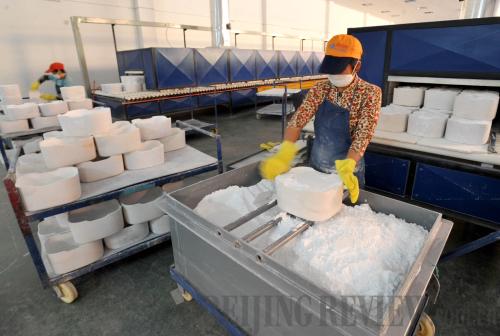|
 |
|
AT FULL CAPACITY: Workers process rare earth products in a workshop of a company in Quannan County, Jiangxi Province (CFP) |
Su also said that China will continue to encourage foreign investment in the sector. Thus far, the United States, Germany, France, Canada and Japan have set up 38 wholly owned or jointly funded rare earth companies in China.
"As the next step, we will encourage foreign investment in environment restoration, recycling and reuse of rare earth wastes, as well as in manufacturing of rare earth processing equipment. This will help enhance China's ability in protecting the environment and resources when exploring and processing rare earth."
MIIT and MOFCOM will continue international communication to clarify China's stance on this issue. China has never intended to gain any economic or political benefits with such a minor sector as the rare earth. It will accelerate coordination with other rare earth producing and consuming countries to solve resource and environmental problems facing the sector.
"We hope to facilitate continuous improvement of rare earth technology around the world," said Su.
Meanwhile, China will refuse to loosen its regulations on the sector. Dealing with rare earth pollution is a major problem that the Chinese Government is facing when tightening regulations. On August 6, the MIIT released the Entry Criteria of the Rare Earth Sector, rectifying the sector from production scale, processing technology and energy efficiency. It's widely estimated that 20 percent of the production capacity will be phased out.
Reflection
Whether China can win the WTO dispute remains to be seen.
China's restriction on rare earth production and export is meant to protect the environment, a move that is accepted under WTO rules, said Song Hong, head of the Department of International Trade at the Chinese Academy of Social Sciences.
"But the United States, EU and Japan claimed that rare earth was not among the list of China's export control products when China entered the WTO. This is quite disadvantageous for China. China promised to impose a tariff on 84 products during its WTO entry, but rare earth is not among them," said Song.
China will continue its regulation on the sector whether it wins or loses in the trade friction. Shutting down polluting exploration and processing factories will inevitably restrict its rare earth exports. For China, the important issue isn't in winning or losing the appeal but in reflecting why the rare earth regulation has triggered such an international dispute.
"The essential problem lies in the production link. We should reflect on why we failed in rectifying such a small sector after years of efforts," said Tu Xinquan, Deputy Director of the WTO Research Center under the University of International Business and Economics.
Although China has exploration and smelting quotas each year, illegal mining and illicit extraction of rare earth resources and smuggling of rare earth products through bypassing the export quota system are common problems in the sector because we lost control of the source, said Tu.
In order to control the source of the whole sector, China should initiate a strategic plan on rare earth exploitation and a general layout for its further development. Moreover, the country should enhance the approval threshold for strategic resources, such as rare earth minerals, said Tu.
Any mines approved before that are not in line with relevant government policies and regulations should be shut down. Industrial integration is the key. After integrating the currently fragmented industry, industrial behemoths will have the sense and ability to control productivity and prices, even without government restriction and supervision, said Tu.
Similar practices are quite common in other countries, such as the iron ore industry in Brazil and Australia. They enjoy a very high industrial concentration ratio and their exports rely heavily on price control, but they seldom receive lawsuits, said Tu.
Email us at: lanxinzhen@bjreview.com | 